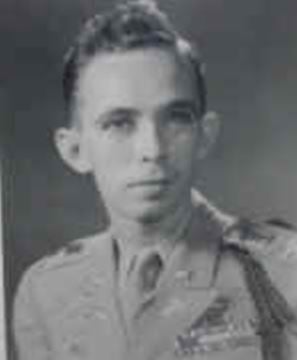- Colonel
- WW II
Biography
Colonel Edward J. Regan was a native of Providence, Rhode Island and a 1936 graduate of Classical High School in Providence. Ed entered Rhode Island State College (now the University of Rhode Island) in the fall of 1936 and enrolled in the Army Reserve Officers Training Corps program. He was an outstanding scholar and member of the Phi Gamma Delta Fraternity. In June 1940, he graduated from URI with a Bachelor of Science Degree in Chemical Engineering and was commissioned as a Second Lieutenant of Infantry.
Colonel Regan participated throughout the European Theater during World War II and held a number of significant infantry leadership positions during the war. His most noted service came during the invasion of Germany in 1945. In February of that year, he was the commander of the first assault boat as the 3rd Battalion of the 28th Infantry Regiment crossed the flood-swollen Roer River. After a near-miss by a German artillery shell, Lieutenant Colonel Regan and his troops were thrown into the river, losing most of their equipment. They were able to climb back into their boat and complete the crossing.
On the other side of the river, Lieutenant Colonel Regan clipped barbed wire and led his battalion into hand-to-hand combat with the German forces. They captured seven lines of trenches and enough German equipment to hold their position against multiple counterattacks. It was two days before U.S. reinforcements reached their positions. For this action, Lieutenant Regan was awarded the Distinguished Service Cross, our nation’s second highest award for bravery.
While serving with the 8th Infantry Golden Arrow Regiment in Germany, Colonel Edward J. Regan earned the Silver Star for capturing an enemy machine gun emplacement. In combat a month and a half later, he swam a river under enemy fire after one bullet had broken a bone in his leg. He returned to the United States for treatment and rehab.
Colonel Regan underwent 16 operations on his shattered leg before it was finally amputated. Despite his injury, he was asked to serve under General Bryant Moore in Korea. Because of the loss of his limb, Regan asked whether there would be any restrictions on his service, and the Army advised him that he should not march more than a dozen miles a day.
Colonel Regan was a brave and courageous leader throughout the war, and a highly decorated one. Among his decorations are the Combat Infantry Badge, Distinguished Service Cross, Silver Star, Bronze Star with Two Oak Leaf Clusters, Purple Heart, Presidential Unit Citation, and the prestigious Rhode Island Cross for Valor. The French Croix de Guerre Avec Etoille Vermille was personally presented to Colonel Regan by French General Charles de Gaulle.
At age 27, Colonel Regan became the youngest Infantry Regimental Commander in the European Theater of Operations. The Army began questioning whether Colonel Regan was too young to hold such a lofty rank. General Moore was killed before Colonel Regan could join him in Korea; and rather than accept a demotion, Colonel Regan resigned from the Army and went to law school.
He was a 1954 graduate of Boston College Law School, and he became the first Probate Judge in the Town of East Greenwich, serving as town moderator. He also was head of the Rhode Island Bar Association Grievance Committee. He was chairman of the Eagle High Court of Honor for the Boy Scouts of America. The Narragansett Council of the Boy Scouts of America as part of their tribute to “Scouts Who Served” in the US military made special recognition of Colonel Regan. Edward Regan was an Eagle Scout and often attributed his early scout training to his development as a successful soldier and civilian businessman.
Although Regan was among the most decorated soldiers ever from Rhode Island, he never really swapped war stories. When his children were roughly in their teens, the family returned to some of his service sites. A barmaid in Northern Ireland, where his troops were stationed, recognized him. She just dropped everything and ran over to the stairs and yelled up the stairs, “Captain Regan is back!” The mayor of a German town, that Colonel Regan had helped resurrect after the war, presented him with the town seal and a letter commending him for his humane treatment of the residents.
Lieutenant Anastasia Gray, an Army nurse during World War II met and married Colonel Edward J. Regan as he recovered from his war wounds. The Regans were part of what NBC anchor and author Tom Brokaw has heralded as “The Greatest Generation.” They both served and moved on, rarely discussing their war roles.
Colonel Regan lived his entire life serving others; and his accomplishments and battlefield gallantry is in keeping with the highest traditions of the military service and reflects great credit upon himself, his family and the University of Rhode Island.
Colonel Edward J. Regan died 19 August 1997 and was buried with full military honors in East Greenwich, Rhode Island.
Education
1940

